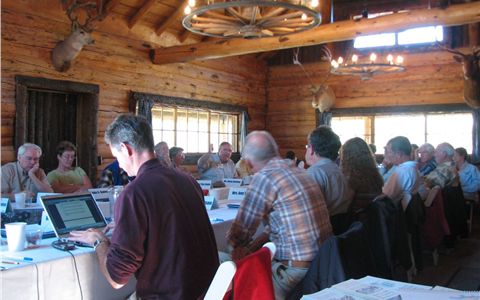Purpose
- Explores and develops market-based solutions.
Summary
Economics teaches us how the market process, including voluntary organizations, can help us achieve our environmental goals. It also tells us that choices among competing values are indeed necessary in the environmental arena as they are in every other sector of society. The exploration of trade-off is a fundamental part of economic analysis.
This project explores and develops market-based solutions to environmental problems with an important audience: religious leaders. With them we will explore how economic analysis may be used to examine environmental policy alternatives, in a manner that minimizes unintended, negative consequences, while maximizing positive impact on the environment.
Description
FREE’s goal is to increase the economic understanding of religious leaders as they approach environmental policy. These leaders are influential nodes in a network of congregations, providing a conduit to disseminate market-based environmental ideas to millions of Americans. With them, we will explore how economic incentives, secure property rights, and responsible prosperity, can also foster a healthy environment.

Purpose
This project explores and develops market-based solutions to environmental problems by engaging religious leaders in a discussion about how economics can help them design prudent and effective environmental policies.
Religious leaders will be more effective if they understand some basic economic principles. Without an understanding of basic economics, commonly accepted command-and-control “solutions” to environmental problems portend great mischief and worse outcomes, especially for the poor.
We find this troubling, for the low-hanging fruit has been picked, e.g., legislation removing lead from gasoline and CFCs from the atmosphere. Remaining problems are complex and frequently require time- and place-specific knowledge. Problems with these attributes are unlikely to be resolved by a bureaucratic, one-size-fits-all approach.
Scope
Many environmental groups frequently denounce economic progress and modernity, urging heavy command-and-control bureaucratic approaches to environmental problems as a “progressive” alternative. This conflicts with the values of a free society. In addition, these one-size-fits-all policies often lead to unintended harm to the environment and/or the nation’s economy.
Many religious leaders feel inadequate motivations and political power are the primary barriers to a better, more environmentally sensitive society. According to one poll, 52 percent of evangelicals support strict environmental regulation. Their implicit solution is to place ethical, intelligent people in positions of authority and empower them to pursue good policies. They want Green Platonic despots, yet no society has ever divined a way to identify and deploy such rulers.
FREE takes a different approach. We believe that moral suasion and the market economy are in fact complementary, and that the best policies align economic incentives with ecological goals. Not only is our approach better for the environment, but it also preserves liberty and economic growth.
Information Dissemination
Our conferences build social networks. Responsibility for the management and dissemination of information is shared by FREE’s founder and Chairman John A. Baden, Ph.D., Executive Vice President Pete Geddes, and Publications and Program Coordinator Kristyn Birrell.
Dr. Baden is the author or editor of ten books, numerous articles on ethics and natural resources, and a column in the Bozeman Daily Chronicle and Headwaters News.
Pete Geddes writes regular opinion editorials for the Bozeman Daily Chronicle. These writings have also appeared in the Journal of Forestry, Frontiers in Ecology and the Environment, The Wall Street Journal, the Seattle Times, and on the Internet at the National Center for Policy Analysis’ Policy Digest, Tech Central Station, the Commons, and A Better World.
Kristyn Birrell produces FREE’s annual report and quarterly newsletter, FREE Perspectives, and writes and edits op-eds for the Bozeman Daily Chronicle and other outlets.
Amount Approved$10,000.00
on 11/7/2006
(Check sent: 11/29/2006)